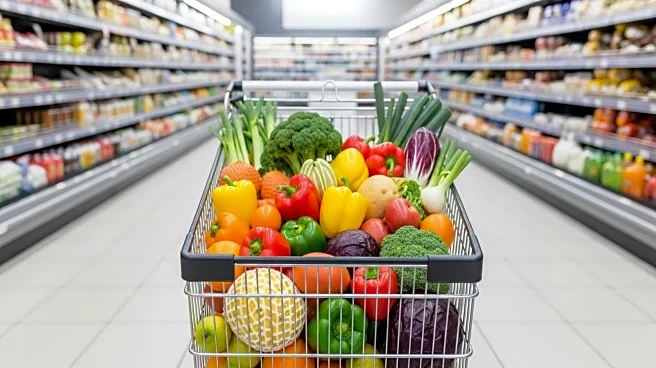What's Happening?
Amazon has introduced a new private label brand called Amazon Grocery, which merges its existing Amazon Fresh and Happy Belly brands. This new brand features over 1,000 food items, all rated four stars or above, including essentials like milk, olive oil, fresh produce, meat, and seafood. Most products are priced under $5, aiming to provide exceptional value to customers. The launch includes popular items such as cage-free eggs, Caesar salad with chicken, and oven-roasted turkey breast. Amazon Grocery is available through Amazon.com and Amazon Fresh stores, offering a wide range of grocery products at competitive prices.
Why It's Important?
The launch of Amazon Grocery is significant as it reflects Amazon's strategy to expand its private label offerings and cater to price-conscious consumers. By providing high-quality food items at affordable prices, Amazon aims to strengthen its position in the grocery market, competing with traditional grocery stores and other online retailers. This move could potentially disrupt the grocery industry by attracting more customers to Amazon's platforms, thereby increasing its market share. Additionally, the focus on sustainability in packaging aligns with growing consumer demand for environmentally friendly products.
What's Next?
Amazon plans to expand its Amazon Grocery line with new items such as frozen pasta meals, pie fillings, and deli meats in the coming months. This expansion is expected to enhance the variety available to customers, further solidifying Amazon's presence in the grocery sector. As the brand grows, it may prompt reactions from competitors who might need to adjust their pricing strategies or product offerings to maintain their market positions. Additionally, Amazon's emphasis on sustainability in packaging could influence industry standards, encouraging other companies to adopt similar practices.
Beyond the Headlines
The introduction of Amazon Grocery highlights the increasing importance of private label brands in the retail industry. These brands allow companies like Amazon to offer unique products that differentiate them from competitors, while also providing higher margins. The focus on affordability and quality may also reflect broader economic trends, where consumers are seeking value without compromising on quality. Furthermore, Amazon's commitment to reducing plastic usage in packaging could contribute to broader environmental efforts, setting a precedent for other retailers to follow.









